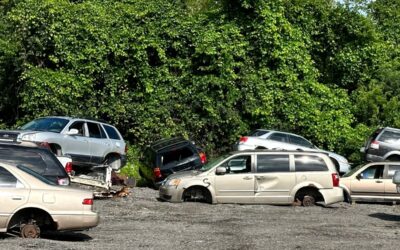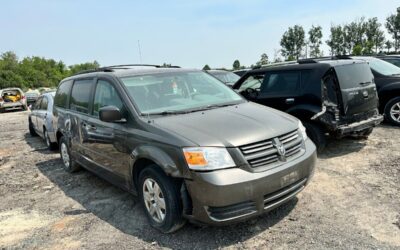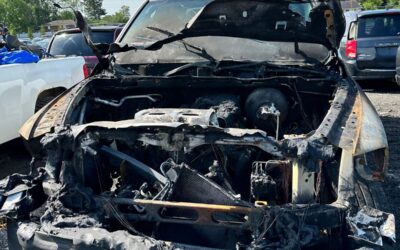Introduction
If you’ve been in a serious accident, it’s often not clear-cut whether you should fix or scrap your car. Even if the damage seems repairable, factors like cost, long-term reliability, and insurance implications can completely change your decision.
If you’re in Ontario, understanding your options and the financial implications can help you make an informed decision. Read on to learn when it makes sense to fix your car, and when you are better off scrapping it.
What is Considered Major Damage to a Car?
Major damage generally means there is a significant hit to the frame, engine, suspension, airbags, or electronics. The car may still start and drive, but it could require thousands in repairs to restore it after the damage. While body shops can easily fix panels and lights, frame damage, bent structures, or damaged internal components often remain hidden—and may prevent the vehicle from being fully safe or properly aligned again.
Always check the kind of damage done before deciding on whether or not to repair the vehicle. In Ontario, if repair costs exceed the current market value, you may find you’re insuring a total loss vehicle. That’s why getting a professional estimate as the first step is always a smart move.
Can Insurance Cover All Repair Costs?
If you have collision or comprehensive coverage, insurance typically will cover repairs following an accident, but there is a caveat. Insurance companies determine the value of your car (Actual Cash Value, or ACV). If the repair cost exceeds the ACV, your insurer won’t cover the full repair amount. Instead, they’ll pay a settlement based on your car’s pre-accident value. In Ontario, when the car is a total loss, you are only entitled to the settlement. You may keep the damaged car, but you will have to register it as salvage and then repair it according to strict safety regulations.
How Do You Calculate If Repairs Are Worth It?
Evaluate three factors: repair costs, your car’s current value, and how long it’s likely to last after the repairs. If the repairs will cost more than 60%-70% of the value of the vehicle, most experts will likely tell you to reconsider.
For example, if your car has a value of $6,000, but will require $5,000 to repair, you may not be making the best financial decision. And do think about what else may give you trouble in the future. A car that has been repaired but suffered serious damage may face alignment issues, diminished fuel efficiency, or increased risk of other safety concerns thereafter. Today’s repairs could lead to more expenses down the road.
Also Read: What to do with a car that is Not Worth Fixing?
What Other Hidden Costs May Be Involved?
Beyond the repair estimate, you might face extra costs like alignment checks, airbag replacements, electronic diagnostics, rental car fees, higher insurance premiums, and the time spent managing your claim.
If the shop discovers additional damage after opening the car, your repair bill could go up substantially! In Ontario, if you get a safety certificate after your major repairs, you are not legally able to put your car back on the road unless you do this.
Is Your Car’s Age and Mileage Important?
If you have a newer car with low mileage, repairs might be worth it if your car has long-term value. Cars over 10 years old or with more than 200,000 km typically gain only a limited lifespan from repairs, as such fixes usually offer short-term value.
After the repairs, nothing is stopping you from experiencing these issues again or having other issues like an engine with significant wear, rust or transmission failure. In Ontario winters, the salt and moisture are really difficult on older vehicles. Even if you were successful in repairing your older vehicle, rust or wear may be evident after a larger accident.
Is the Car Safe After Repairs?
A car with structural damage may not respond as well in a crash or collision after repairs. You may raise your personal risk factor in any future accidents if the airbag system was damaged, or other sensors were damaged or compromised.
In Ontario, the certified repair shops do follow strict safety rules. However, no repair can fully restore a badly bent frame—it will never be truly new again. If the car is not 100% structurally sound, it may not pass a safety inspection and may not keep you safe while driving.
Can You Sell a Car Again, Even if It Was Repaired Afterwards?
If your car is registered as a “total loss” and you get it repaired afterwards, it is now registered “rebuilt” in Ontario. Buyers usually do not want to buy a rebuilt car and would pay significantly less for it. Even if the repairs were top-notch, your vehicle history report will still reflect the accident. Therefore, if you do intend to sell or trade the vehicle, be ready for low offers. But if you scrap it now, you might get some cash right now and not have to worry about it as an ongoing sales problem in the future.
Also Read: What to Do When Your Car Is Written Off in Ontario
When Might Scrapping Be a More Viable Option Than Repair?
If your car has significant structural damage, is of low value on the market, has hefty mileage, and any repair outcome is uncertain, scrapping is often a better option. For many Ontarians, spending thousands on an older or heavily damaged car often adds stress and risk, especially if the repairs won’t truly restore performance or safety.
Also, if your insurer has declared your car a total loss, disputing that decision may negatively affect your ability to resell the car or to get full insurance again. The easier, safer option is to scrap the car.
Conclusion
Fixing a vehicle after a major accident isn’t always the best choice. If the damage is extensive, repair costs are high, or safety can’t be guaranteed, it’s often smarter to scrap your car in Ontario and move on. Greenway Auto Recycling is here to help. They provide dependable and safe scrap car removal throughout Ontario and take care of everything for you, from free towing to explaining how to safely dispose of your license plate.
Their staff will ensure that the removal of your vehicle is safe and legal, so you will have no headaches. Regardless of whether your vehicle is a total loss or not worth fixing, Greenway can help you maximize fair value and, more importantly, make room for something new!





